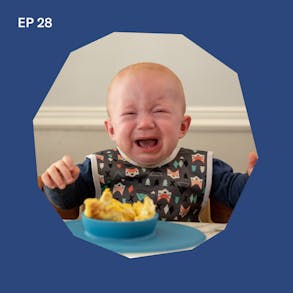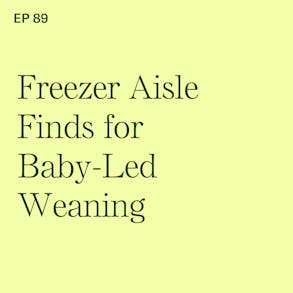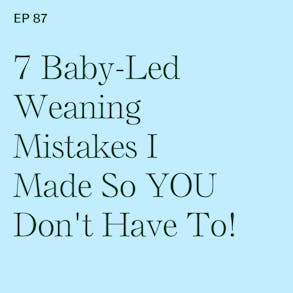Constipation and Starting Solid Foods: Simple Remedies for Your Baby
- What are the normal, run of the mill changes you can expect to see in your baby's poop and how the consistency, frequency and volume of bowel movements change too when you start solid foods
- The signs and symptoms of constipation, including the difference between problematic constipation that requires an intervention vs. typical, run-of-the mill constipation that will literally work itself out!
- Safe interventions and treatments you can implement if your baby needs some special foods or suppositories on occasion because of constipation.

LISTEN TO THIS EPISODE
Episode Description
Starting solid foods is exciting… but what happens when your baby gets backed up? In this episode, I’m breaking down why constipation happens when babies start eating solid foods, which foods might be making it worse, and — most importantly — safe, simple remedies to help get things moving again.
You’ll learn:
✅ Why constipation is common (but fixable!) when starting solids
✅ The difference between normal poop changes and true constipation
✅ High-fiber, baby-safe foods that can help relieve constipation
✅ How to safely use small amounts of juice (only when needed!)
✅ When it’s time to call your pediatrician

Plus, I’ll share practical tips on how to prepare constipation-relieving foods safely for self-feeding babies. If constipation is stressing you out, this episode will leave you feeling calm and confident!
Links from this Episode
- Baby-Led Weaning with Katie Ferraro program with the 100 First Foods™ Daily Meal Plan, join here: https://babyledweaning.co/program and get $50 off when you sign up using the code BLWPOD50
JOIN NOW AT $50 OFF CODE: BLWPOD50
- Baby-Led Weaning for Beginners free online workshop with 100 First Foods™ list to all attendees, register here: https://babyledweaning.co/baby-led-weaning-for-beginners
Other Episodes Related to This Topic
- Episode 24 - Water: When to Offer Your Baby Water and How Much
- Episode 273 - Chia or Flax Seed: Which is Better for Babies?
Resources & Research
American Academy of Pediatrics. "Fruit Juice in Infants, Children, and Adolescents." Pediatrics, vol. 139, no. 6, 2017, article e20170967,https://publications.aap.org/pediatrics/article/139/6/e20170967/38754/Fruit-Juice-in-Infants-Children-and-Adolescents.
Blackmer, Allison Beck, and Elizabeth Anne Farrington. “Constipation in the pediatric patient: an overview and pharmacologic considerations.” Journal of pediatric health care : official publication of National Association of Pediatric Nurse Associates & Practitioners vol. 24,6 (2010): 385-99.
Loening-Baucke, V. “Constipation in early childhood: patient characteristics, treatment, and longterm follow up.” Gut vol. 34,10 (1993): 1400-4.

Latest Episodes






Katie Ferraro (0s):
Are you trying to squeeze the starting solid food stuff into your already busy schedule? Well, I have an all-in-one done for you solution that's going to take the guesswork out of feeding your baby. My online program is called Baby-Led Weaning with Katie Ferraro contains all of my Baby-Led Weaning training videos, the original a 100 First Foods content library, plus a hundred day meal plan with recipes like the exact sequence of which foods to feed in which order. So if you wanna stop trying to piece all this feeding stuff together on your own, I would be honored if you would join me inside of the program. You can get signed up at babledweaning.co/program. And when we look at a baby who has ever only had infant milk, so breast milk or formula in their gut and their digestive tract for the first six months of life, now all of a sudden you're starting to slowly layer in some new solid foods and all of the food components that come along with that, the new carbohydrates, the new types of, you know, dietary protein that they've never had before.
Katie Ferraro (48s):
Yes, there is going to be some degree of constipation and we're gonna see changes in the stool for sure, right? You're going from very frequent soft stools to less frequent, more formed stools. But when does that constipation become problematic? That's what we're looking at here. Hey there, I'm Katie Ferraro, registered dietitian, college nutrition professor, and mom of seven specializing in Baby-Led Weaning. Here on the Baby-Led Weaning with Katie Ferraro podcast. I help you strip out all of the noise and nonsense about feeding, giving you the confidence and knowledge you need to give your baby a safe start to solid foods using Baby-Led Weaning.
Katie Ferraro (1m 33s):
Does this sound familiar? You've started some solid foods and you've also started to notice your baby is a little bit constipated. Maybe they're a lot constipated, And I know there's thoughts going through your head. A, nobody wants to see their baby struggle, and that's what happens with constipation. And B, is it the foods that I'm offering? Am I not doing enough breast milk? Why is this baby constipated? In today's episode, I'm gonna cover all things related to Constipation and Starting Solid Foods along with some simple safe remedies for your baby. Each week I put out two podcast episodes. I always do a mini training episode on nutrition feeding health topics like the ones today. We're doing constipation today, but that episode comes out on Monday, and then Thursday is a longer interview style episode with another feeding expert.
Katie Ferraro (2m 19s):
If you're not already following the show, please hit subscribe or follow so that you'll get notified every week when both of the episodes go live. And if you have a friend whose baby is also starting solid foods, if they're struggling with anything or just interested in learning how to give their baby a safe start to solid foods, please do tell them about the podcast. I really appreciate your help. Word of mouth is the most important thing for getting this information out there. I love to start each of these mini training episodes with a Baby-Led Weaning tip of the day. And today's tip is regarding gut health. Parents sometimes worry when things like constipation, they think, oh, that's an indicator that my baby can't digest or shouldn't be eating a certain food or food group.
Katie Ferraro (2m 59s):
The American Academy of Pediatrics reminds us that the infant gastrointestinal tract is able to digest and efficiently absorb virtually all nutrients by two to three months of age. Now, of course, we don't feed babies food from all sorts of nutrients at two to three months of age for two reasons. One, breast, milk, or infant formula is sufficient to meet your baby's need for the first six months of life. So you don't need to offer anything before that. And secondly, from a physiological standpoint, your baby is not yet ready to swallow anything besides infant milk prior to six months of age. So even though the gut is ready to handle it, hold off until that all important six month mark. Plus, when your baby is showing the other reliable signs of readiness to eat. And the reality is constipation is a change that you're going to see when your baby starts solid foods, okay?
Katie Ferraro (3m 44s):
But we are human beings, and especially as parents, we fear change. Hang tight, because In this episode I'll share a number of really actionable tips and items, interventions that you can safely implement, including a super easy prune puree recipe that we use all the time to help kind of get things going if your baby is a little stopped up. Now, I wanna share a couple of training stories. I have a couple of moms from my program. I put the word out to parents in my program. I'm doing a podcast episode of about constipation. Can you share your stories about constipation? So three moms who wrote back, I'm just randomly picked their stories. One mom's name is Paige. She said, my baby is always constipated. She's 10 months old. So I make your apple pair and P prune puree recipe, and then I'll mix it with either oats or hemp seed Chia or Flax Seed.
Katie Ferraro (4m 29s):
And I offer that a few times a morning if needed. Jackie is another mom who said, my eight month old hasn't gone poop in almost a week tomorrow, but she's not showing any signs of discomfort. I think I'm going to try the apple prune pear puree tomorrow. Or maybe just a little bit of juice. Is that okay? We'll talk about juice in today's episode two. And then divya another mom who said, my baby usually poops every day in the morning. But recently he was constipated and didn't poop for four days straight. The next day he was crying, very bad pushing. He did come back to his routine in a couple of days though. So tell the other moms things will work themselves out. So let's get started talking about constipation. Starting first with what's normal regarding babies and bowel movements.
Katie Ferraro (5m 12s):
So constipation in infancy is defined as significant spacing between bowel movements and defecation that is extremely dry, hard or painful. So it's important to not only look at your baby, but you gotta be examining the poop if and when that occurs. So as you're likely aware, normal stooling patterns are gonna vary from infant to infant, right? No two babies are created the same. And your baby's stooling pattern is also going to change when the diet changes. So when you introduce solid foods, sometimes right off the bat parents are like, I don't even know what you're talking about. My baby's not constipated. And then a few weeks into solid foods, they're like, whoa, hold up. This is what you were talking about. The reality is early on when you start solid foods, your baby's not actually eating that much.
Katie Ferraro (5m 55s):
There's like literally no actual change in their diet. 'Cause breast milk or formula is still providing the majority of their nutrition now as they get a little bit more proficient at eating solid foods and they actually start to quote unquote eat some of that food. Ooh, yeah. That's when we see the constipation kind of pick up. So what's normal as far as stooling patterns go, there's a huge range, like a lot of things in food and nutrition, okay? Babies who are breastfed or for going to, you know, babies who aren't hydrolyzed formula, there's all sorts of different ways to feed your baby. A baby's gonna typically have anywhere between one and even up to 12 bowel movements a day. Okay? And you know how much things have changed since your baby was a newborn and they were stooling, you know, every couple of hours more frequently than that sometimes. And then it slows down as their stomach gets a little bit more developed and they start to take fewer, but higher volume feeds, the stooling pattern changes, it's gonna get a little different.
Katie Ferraro (6m 44s):
Even as you start solid foods, right? You're gonna go from largely liquid soft stools towards increasingly more firmed, yet less frequent stools. Okay? Constipation is pretty rare in breastfed infants, especially exclusively breastfed infants. Okay? So sometimes the breastfeeding moms are a little bit more taken aback by the changes that come with starting solid foods. If you switch from breast milk to formula, you know that there's the like couple of rocky days where the poop smell really different. Sometimes you're like, oh my gosh, what's going on? But it's just your baby's body adjusting to the different type of infant milk. Now, what causes constipation? So constipation in babies can be caused by a few things. Sometimes it's due to a sudden drop in fluid intake when solid starts. Like if you are actually forcing them to eat too many solid foods by spoon, they're gonna drink less infant milk.
Katie Ferraro (7m 29s):
We don't want that. One of the benefits of Baby-Led Weaning is they gradually get the hang of eating solid foods. And infant milk continues to be an important source of nutrition and hydration. Oftentimes, if we're relying on very low fiber, refined, processed baby foods. So if you think about the history of using iron fortified refined white rice cereal, for a lot of families, that would be the only baby food they would feed for weeks on end. Of course, there's absolutely no fiber in that, and that can lead to increased risk of constipation. Hey, we're gonna take a quick break, but I'll be right back.
KiwiCo (8m 4s):
I grew up playing a lot of sports, and six of my seven kids are really into sports. And then my youngest is not so much she begrudgingly will play soccer, but really art is her thing, And I wanna be able to share that experience. But I am the least artistic person on the planet, And I don't really feel like I have the skillset to be an art mom, which is why I am so grateful for Kiwi Co. Kiwi co clubs is the perfect gift for curious minds. Kiwi co develops hands-on projects and activities for kids of all ages. They have five clubs to choose from with unique topics like science, technology, engineering, art, and math. And for my youngest, the artist, we get the Kiwi Co Studio. It's for ages six and up for art and design. And the last box had this motorized spin art project, which was so cool. We set it up together and then she went to town. My refrigerator is literally now a spin art gallery, but one thing I love about Kiwi Co is that the projects can be played with over and over again. So they won't just be sitting on a shelf. Your child can build skills while discovering cool science and art concepts through fun hands-on projects delivered to your door. Every month, Kiwi co crates encourages kids to be creative, bold, curious, and persistent through hands-on play and projects. And there are no commitment. So you can pause or cancel anytime. If you're ready to tinker, create and innovate, you should check out some of the awesome gifts from Kiwi Co. Get up to 50% off your first crate at kiwico.com with the promo code weaning. That's up to 50% off your first crate at kiwico.com. Promo code weaning, and I'll spell that one. It's WEANING.
Katie Ferraro (9m 46s):
For babies that don't have a lot of movement, you'll notice that your baby's gonna be less constipated as they start moving around more. So usually we start solid foods before babies are crawling. Occasionally there's a baby who's crawling at around the same time they're starting solid foods. Those babies tend not to be constipated, okay? But you know, from being an adult, the things that most of us do, not eating enough fiber, not drinking enough water and not moving around enough, okay? That's sedentary lifestyle. Those are risk factors for constipation. So what do you do? You eat more foods that naturally contain fiber, you should drink a little bit more fluid, and you should definitely get your body moving to get things moving. So know that when your baby starts crawling and then eventually walking, constipation tends to decline as well. Iron supplementation, especially from iron drops, or if you're using a lot of fortified foods, that can make stools harder and more difficult to pass.
Katie Ferraro (10m 31s):
But every baby reacts differently to changes in their environment and their diet. So you gotta kind of find that right balance for your baby of naturally occurring sources of dietary fiber of fluids, and then offering iron rich foods. If you have a copy of my 100 First Foods list, if you check out the protein and the starchy foods, you'll see a lot of whole grains. You'll see a lot of plant animal foods in there. There's lots of iron in there, okay? Those tend not to constipate your baby. What the starchy foods and the fruits and the vegetables on the 100 First Foods list do though, is they provide your baby with a naturally occurring source of dietary fiber. And when you offer a variety of those foods, your baby's getting both soluble and insoluble fiber, which means they're getting the whole range of health benefits that plant foods offer, that works both on their overall health and on their gut health as well.
Katie Ferraro (11m 17s):
So what are The signs and symptoms of constipation? Constipation is kind of hard to define. It's so interesting if you look at the clinical literature, in some cases, infant constipation is only diagnosed after the baby has gone seven days without a poop. And a lot of times you're like, oh my gosh, my baby hasn't pooped in forever. But if you write it down and keep a schedule, sometimes it's only a couple of days and your baby went from having multiple poops a day, they're gonna get to a point where they probably only have about one poop a day. And sometimes it's even less frequent than that. So signs of constipation include hard or pebble or pellet like stools that are not followed up by a soft bowel movement. They'll have a bowel movement movement that's accompanied by pain or difficulty in passing the stool. So if the baby's, you know, wrenching their back and crying and screaming when they're passing a stool, that could be a sign that there's something going on with regard to constipation.
Katie Ferraro (12m 5s):
Now, oftentimes parents get worried when there's less frequent bowel movements, okay? That can be misleading. It doesn't always signify that there's a problem. It could be signifying that your baby's starting to learn how to get more nutrition from food and less from milk, at which point they're going to have less frequent and more formed stools. So when is constipation a problem? Okay, according to the American Academy of Pediatrics, constipation in babies is considered problematic or concerning when the stools are one, hard, dry, or painful to pass. Two, if the baby is straining excessively or appears to be in pain during bowel movements. Three, if the stool frequency is very low. So for babies who are starting solid foods, if they're going, you know, somewhere between five or seven days without a bowel movement combined with signs of discomfort, that could be concerning.
Katie Ferraro (12m 50s):
Number four, if there's blood in the stool, okay? Often it could be from an anal fissure due to straining, it could also be a signifier that there's something else going on. Okay? A lot of times parents, I know we do beets as one of the vegetables in our a 100 First Foods Daily Meal Plan. And for parents that are offering their baby beets, you just gotta be heads up. Sometimes what you see in the stool, you're like, oh my gosh, that's blood in the stool. It's just the beat compounds and the color of the bee coming through in the stool and not necessarily blood. So check your baby's diet. If you did beat, it's probably not blood in the stool. Number five, if the baby is refusing to eat, or if the baby seems uncomfortable or fussy, that could potentially be from the stool backing up or causing pain. Also, if there's abdominal swelling or vomiting along with constipation, that could be problematic.
Katie Ferraro (13m 32s):
So the American Academy of Pediatrics emphasizes that constipation is not just infrequent stooling, okay? It's more about the consistency, the difficulty, and the discomfort associated with passing stool. So in short, if your baby's poop is hard and painful to pass, if it's tiny little pellets and it's not followed by a big old soft blowout, that's a problem. But the big old soft blowout, that's an indicator that the constipation is resolving itself, okay? Even though it's not fun to clean up after your baby's oftentimes much relieved after they get through that point. Now, when is constipation not concerning? Again, if those soft, hard pellet like stools are followed by a big old soft bowel movement or blowout, that is a good sign. Okay? And we talked more too about when babies start to move around and get a little bit more mobile, you're gonna see a lot less constipation than you may be right now in the earlier stages when you're starting solid foods.
Katie Ferraro (14m 20s):
So what sort of treatments or interventions are there? Okay, if your baby's constipated and you're looking it up online, you might come across some information about suppositories. Okay? So some pediatricians will give or recommend a glycerin suppository. I know personally with my youngest babies are twins, boy, girl, twin. And I remember when we just moved to our new house, we were just getting unpacked this baby, the babies, the twins were so chill by then. And I remember my son like screaming his head off, And I like hadn't been paying attention, but I like, he's like, I don't think he's had a bowel movement in a really long time. Big old distended abdomen. I mean, he was in so much pain and it was freaky to see his stomach so distended went to urgent care, and guess what they did? They gave him a glycerin suppository and then sent me a thousand dollars bill.
Katie Ferraro (15m 3s):
And from that moment on, I was like, you know what? I think I'm gonna check with my pediatrician about whether or not it's okay for me on occasion to give the glycerin suppository myself so that I can avoid the thousand dollars urgent care bill. Now, pediatricians will recommend that, you know, suppositories are for occasional and not regular use. The a a P does recommend against the use of mineral oils, stimulant, laxatives, or enemas for infant constipation. Okay? If you're having to treat constipation every day with a suppository, that's not good. Okay? That's just a bandaid. We gotta find out what the underlying problem is. But you, if every now and then you gotta do it yourself to avoid a big bill and your doctor says it's okay, I personally have done that, and it's helped with constipation relief. So again, suppositories you should check with your doctor.
Katie Ferraro (15m 45s):
They should be used sparingly and only as a short term solution, but they're not meant for regular or frequent use. 'Cause the baby's body can be dependent on them or can become dependent on them. We wanna address the root cause of constipation, but a lot of times the root cause is, Hey, my baby's starting to get more nutrition from food, and this is just an indicator that their gut is learning how to adjust to these different compounds from foods, especially those dietary fibers. Okay? Infant milk is great as it is, doesn't have any fiber in it. So as your baby starts learning how to eat plant foods that contain fiber in it, they're gonna get a little stopped up. Okay? So you should always consult with your pediatrician before using a suppository, especially if there's ongoing issues. Now, what about fruit juice? Okay, that mom at the top was talking about maybe considering some fruit juice, and you might have like red flagged all over the place.
Katie Ferraro (16m 26s):
Oh my gosh, I hope she's not giving baby her baby juice. The AAP says no juice for babies, but guess what? Juices that contain sorbitol. Okay? Sorbitol is a naturally occurring sugar. Alcohol, fruits like apple and pear and prune. These contain that natural sugar alcohol that promotes laxation. So that's the laxative effect, okay? Coming from these fruits. So although the AAP advises against the regular use of juice for babies under age one, it is okay to use small amounts of fruit juice if you need to to help with a little bit of constipation alleviation. So the guidelines are anywhere between four and eight months of age, okay? A baby could have two to four ounces of a hundred percent fruit juice per day when they're particularly constipated.
Katie Ferraro (17m 7s):
For eight to 12 month olds, you could bump that up to six ounces. Again, that's a hundred percent fruit juice with no added sugars. It's not something you wanna get in the habit of doing regularly. But as the a a P states for infants older than six months, a small amount of a hundred percent fruit juice such as pear or prune juice, which contains sorbitol may be helpful. This amount should be limited two to four ounces per day until the constipation resolves. Now, what about food fixes? Maybe you've heard clinicians talk about the pea fruits. These are things like prunes and pears, plums and peaches. I got a lot of those pea fruits on my original 100 First Foods list, and you don't just have to do juice, because if you offer a safe version of that fruit with the sorbitol in it, that's gonna help with some natural alleviation of constipation.
Katie Ferraro (17m 52s):
If you don't yet have a copy of my original a 100 First Foods list, you can grab that on my free online workshop. It's called Baby-Led Weaning for Beginners. Again, this is a free online video workshop where I'll show you how to prepare a lot of these different foods safely, and you'll see how the babies learn to pick them up and feed it to themselves. And everybody on that free workshop gets a copy of my original 100 First Foods list, so you'll never run out of ideas of foods your baby can eat, including the P foods for constipation. You can sign up for the workshop at babyledweaning.co/workshop. You can take it later today, tonight, when your baby naps tomorrow, whenever is convenient for you. Again, the link to register for that free workshop, Baby-Led Weaning for Beginners, is at babyledweaning.co/workshop.
Katie Ferraro (18m 36s):
Hey, we're gonna take a quick break, but I'll be right back.
Nordstrom (18m 45s):
Nordstrom brings you the season's most wanted brands, skims, mango Free people, and Princess Poly all under $100 from trending sneakers to Beauty must-haves, we've curated the styles you'll wear on repeat this spring, free shipping, free returns, and in-store pickup. Make it easier than ever. Shop now in stores and at nordstrom.com.
Katie Ferraro (19m 14s):
Now, in addition to the pea fruits, you can also do foods like bran or flaxseed. So bran super high in fiber and babies do not need large amounts of fiber, but you can sprinkle a small amount, like a half a teaspoon of wheat bran or O bran into things like yogurt or oatmeal to help with constipation. Again, I just wanna point out though that forcing your baby to eat a lot of high fiber foods that can make your baby feel artificially full, which will fill them up and will kind of blunt their hunger cues, it'll make them feel so full that they don't want to eat enough breast milk or other solid foods. So we don't wanna force the fiber, but we can work it in a little bit here and there. You can also offer other foods that are naturally occurring sources of fiber foods like lentils and beans. I've got in my 100 First Foods list, we've got a protein food section, and there are 20 proteins in there.
Katie Ferraro (19m 57s):
10 of those proteins are plant-based sources of proteins like lentils and legumes and different types of dried peas and beans. And yes, you can make those safe for early eaters, even if your baby doesn't have their pencil or grasp yet. So when they're six and seven and eight months of age, you still wanna offer those foods. I have lots of resources inside of my program, videos and recipes and instructions on how to make all of these naturally high fiber foods safe, even for early eaters. If you wanna check out my full program, it's called Baby-Led Weaning with Katie Ferraro. That's online at babyledweaning.co/slash program. Another great high fiber food that helps a lot with constipation is oatmeal. Okay? Oatmeal is rich, insoluble fiber soluble fiber absorbs water.
Katie Ferraro (20m 38s):
It forms a gel-like substance in the gut that helps strengthen kind of, it adds bulk to the stool, it softens the stool, which in turn makes it easier to pass. So oatmeal, great food for babies struggling with constipation 'cause of that soluble fiber, okay? The fiber absorbs the water, softens the stool, and gets things moving along. Fluids are also important. We don't want your baby to be forced to drink excess water, right? Because most of the fluid needs that your baby has, they're gonna be achieving that from breast milk or formula. So we wanna make sure that your baby's getting enough infant milk to meet their fluid needs. Now, when it comes to fiber, sometimes parents are like, well, how much fiber? You said, don't do too much, but you need to be offering foods that contain fiber.
Katie Ferraro (21m 19s):
There are no established dietary reference intakes for fiber for infants zero to 12 months, okay? And that's according to the National Academies of Medicine. Now, why not? Because for infants, nutrition recommendations focus on breast milk and formula intake with the assumption that solids are being introduced around six months, but also acknowledging that not all babies are ready to start solid foods, right at six months of age, okay? Breast milk naturally contains very little fiber, okay? And so fiber needs during the first year haven't been specifically quantified since infants go through this gradual transition to solid foods, okay? Their gut is still continuing to develop and learning how to handle the different compounds in foods like dietary fiber. So there's no set fiber recommendations for babies under 12 months.
Katie Ferraro (21m 59s):
I just want you to focus on offering a variety of naturally fiber rich foods, okay? Foods from the fruit part of the 100 First Foods list, from the vegetable section, from the whole grains, okay? Even the plant-based proteins are gonna have fibers in there, okay? You always wanna balance those fiber containing foods that you're offering with adequate breast milk or formula. All right? So quick win. If you're walking away, you don't need to force your baby to eat fake fiber foods like fiber supplements, or your baby doesn't need any out of all the other day. If she could just give her baby Metamucil. Talk about Metamucil. I used to work in adult nutrition, and we talk about Metamucil, which is a type of insoluble fiber. That's the bandaid, okay? If you're having trouble passing stool, let's figure out why you are having trouble passing stool for adults.
Katie Ferraro (22m 43s):
It's usually not enough water, not enough fiber, and not enough exercise, sorry. But the Metamucil fiber supplement is not gonna help that for your baby. The reason why they are constipated is 'cause they're a baby who's learning how to eat solid foods. And if those hard pellet stools are followed by a big soft blowout, you are doing just fine. If you go for longer than five to seven days without a stool, talk to your pediatrician about what you should do. Is it something we could do a short term suppository for every now and then? Do we need to work on increasing fluids from breast milk or formula? Do we need to back off of certain foods that might be causing problems, or should we just increase the types of foods that naturally contain fiber as your baby is slowly learning how to eat them? Well, I hope you learned a little bit about constipation today.
Katie Ferraro (23m 24s):
I will put the links to all of the references and resources I mentioned in the show notes page for this episode, which you can find at blwpodcast.com slash two eight. A special thank you to our partners at AirWave Media. If you like podcasts that feature food and science, and using your brain, check out some of the podcasts from AirWave. We're online at blwpodcast.com. If you check the description of this episode, I've got a link to that free online workshop, Baby-Led Weaning for Beginners, where you can grab a copy of my original a 100 First Foods list. If you're ready to dive in and start learning how to make all of these naturally containing fiber foods, like the whole grains and the plant-based proteins safe for your baby, check out my program, Baby-Led Weaning with Katie Ferraro. That's at babyledweaning.co/program.
Katie Ferraro (24m 7s):
And remember, fruits and vegetables are fine, and there's some fiber in there, but your baby needs a lot of the other stuff from those different food groups that maybe you haven't started doing, but you can start doing today. So thanks again for listening. I hope if your baby's constipated, you get past this quickly, And I hope you found today's episode informative and useful. And if you have a friend who's starting solid foods, please tell her or him about the podcast so we can get more of this information out there. I'll see You guys next time. Bye now.
America's Test Kitchen (24m 42s):
Hey, everyone, it's Dan Souza from America's Test Kitchen. I'm super excited to let you all know that we're launching a new video podcast that takes you behind the scenes into the messy, imperfect, but riveting day-to-day life right here in our test kitchen. Not only do I get to talk to my colleagues about the latest taste test they attended, I just came from a tasting of salted caramel waffle pie bars and then roasted garlic, so I apologize, Or about a recipe they're developing. The Thing about this recipe is it's a secret. The restaurateur refuses to tell people what her secret ingredients are. We also chat with amazing guests from the culinary world and beyond the lamest joke I've ever said, no, it's, I said to Marie Manford, that's a great, it's the, it's, you definitely said, great joke. Thanks, Sam. Make sure to subscribe to In the Test Kitchen so you don't miss an episode. You can watch in the test kitchen on YouTube and Spotify and listen to it wherever you get your podcast. Can't wait to see you in the test kitchen.

The Program Baby-Led Weaning with Katie Ferraro
A step-by-step digital program for starting solid foods safely and navigating the original 100 FIRST FOODS™ meal plan with baby-led weaning.
 EXPERT-LED, PROVEN APPROACH TO EATING REAL FOOD
EXPERT-LED, PROVEN APPROACH TO EATING REAL FOOD CONCISE VIDEO TRAININGS TO MASTER BABY-LED WEANING
CONCISE VIDEO TRAININGS TO MASTER BABY-LED WEANING 100 FIRST FOODS DAILY MEAL PLAN WITH FOOD PREP VIDEOS
100 FIRST FOODS DAILY MEAL PLAN WITH FOOD PREP VIDEOS
Baby-Led Weaning for Beginners Free Workshop
Is your baby ready to start solid foods, but you’re not sure where to start? Get ready to give your baby a solid foundation to a lifetime of loving real food…even if you’re feeling overwhelmed or confused about this next stage of infant feeding.
Get baby-led weaning recipes and tips delivered to your email inbox.

